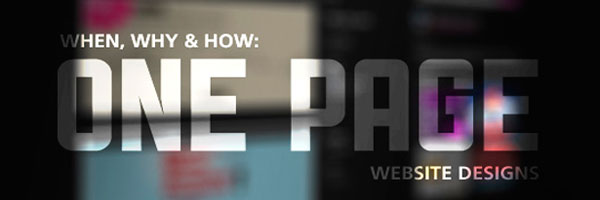Many people think you need to have a huge website with several pages where each page talks about different products, but that’s not always true. Sometimes, a well-crafted website fails to attract traffic and a one-page website manages to leave a good impression on visitors.
What it means is that there are advantages and disadvantages of creating different types of websites, but there are certain things you should know about publishing a one-page website.
Table of Contents
Disadvantages:
You can find different issues when you host a one-page website, but some of the most common cons of having such websites are mentioned below.
1.) You will have limited space to work with, and that’s the reason why it will not be possible to offer enough information about your products, services, and business. It is generally a bad thing, but there are some good things associated with it. For instance, with limited space to play with, you will have to impress your readers with fewer words and your readers in turn will have less content to ignore. Still, you will have a hard time finding the best way to convey different marketing messages through such small websites. Your single page website will definitely have a good conversion rate, but you will have limited space to use and this can go against you.
2.) Many experts believe that you appear only once on the search engine results pages if you have a single-page website. What it means is that if you have several pages on your website, you can rank them for different keywords. Therefore, when someone types a keyword in search engine, some of the pages of your website appear on the first page and some go on the second page. This doesn’t happen when you have only one page in your website.
3.) With a one-page website, you will have a hard time understanding how well your campaign is going. You cannot take full advantage of Google Analytics with one such website, and that’s a big disadvantage from SEO point of view. On a large website, there will be a homepage with a high bounce rate, as well as pages with high popularity — there will also be pages with little or no traffic. It is not possible for Google Analytics software to check your single-page website for these aspects, and that’s why it is hard to get accurate results.
4.) You will have a hard time testing your PPC trial and other error campaigns on a one-page website. It is mainly because you cannot get accurate statistics of how well your website is performing after PPC advertising. As you don’t have multiple landing pages, it is not easy for you to check what’s working and what’s not.
5.) As you have a single page for your viewers, they don’t come back often, as they know nothing would have changed. You will have to do something to make your visitors know that you update your site regularly to provide them with a reason to check it again.
Advantages:
Just like other types of websites, there are certain pros of publishing a one-page website. Here are few for your understanding.
1.) Since you have a limited space to offer your message, you can design it with ease. You don’t have to spend a lot of time adding different design elements, because you know you need to impress your prospective buyers with your text and marketing messages. As you know you only have one page to design, it becomes easier to focus your energies on making it perfect.
2.) If you take your website as an online flyer, it will help you a lot in running an online marketing campaign. As you don’t have to waste time in creating links from one page to another or building one-way links to every page of your website, you will have enough time to improve that single page to perform well in search engines. Moreover, having one such website means that it is your store, not just a website. Therefore, it is easier to attract people and make them buy from you.
3.) You can update your single page website as frequently as you like. There is less content to play with, which means you can make regular changes whenever you deem necessary.
4.) It is easy to handle on-page SEO for your single-page website. You can take your time to find the best combination of keywords and create content accordingly.
5.) On a one-page website, it is easier for users to find what they need. They don’t have to go through a lot of content, images, and graphics to find the desired information, which is a good thing.
 About the Author:
About the Author:The guest post is written by Sonia Jackson from http://www.cool-essays.com. She writes essays on different topics and can give you useful advice.
















I also believe a single page website because its easier to optimize; however, I think its not as flexible as a multi-page website
Yes, Both Have There Own Pros And Cons But I Also Think That Multiple Pages Is Much Better For A Company…